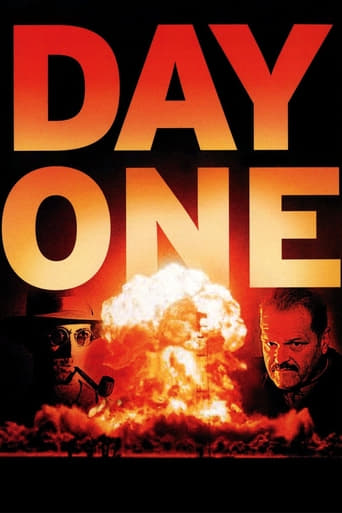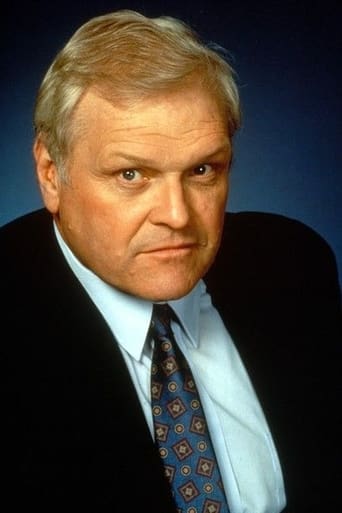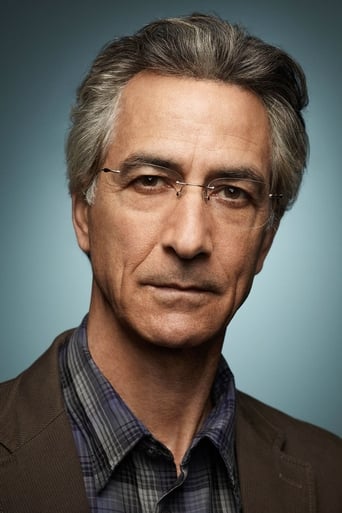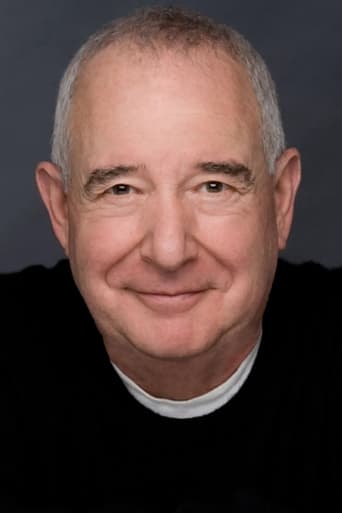Day One (1989)
Hungarian physicist Leo Szilard leaves Europe, eventually arriving in the United States. With the help of Einstein, he persuades the government to build an atomic bomb. The project is given to no-nonsense Gen. Leslie Groves who selects physicist J. Robert Oppenheimer to head the Los Alamos Laboratory in New Mexico, where the bomb is built. As World War II draws to a close, Szilard has second thoughts about atomic weapons, and policy makers debate how and when to use the bomb.
Watch Trailer
Free Trial Channels
Cast


Reviews
Very well executed
A lot of fun.
After playing with our expectations, this turns out to be a very different sort of film.
One of the best movies of the year! Incredible from the beginning to the end.
TV Movie about the creation and use of the atomic bomb in World war II, that is impeccably well researched, detailed, inteligently made and graced by an All-Star collection of secondary actors.Unlike many north American movies and docs, Day One avoids patriotism (in fact it tilts against the use of the bomb) or the temptation of proposing Oppenheimer as a martir. Instead, Oppenheimer's real life ambiguity is represented perfectly. He doesn't want to betray a friend that was investigated for communism but he does it. He thinks about using the bomb as a demonstration at some point but turns into the opposite side: arguing that it may fail or give the Japanese a chance to prepare for an eventual attack. History will never fully understand the person that was Oppenheimer.Another key figure is Leslie Groves. He's a perfectly efficient militar who runs every possible detail of what happens in Los Alamos. He's the force behind the making of the bomb and he makes it sure that it will be used. Brian Dennehy portrays Groves' old fashioned strenght, intelligence and single-mindness perfectly.The third most important person here is Szilard, a physicist whose ideas were key for the development of the bomb but who turned against it's use against Japan (or any other nation) asking President Truman not to deploy the bomb over Japan. He's perfectly captured by Michael Tucker who even resembles the real Szilard. Szilard proposed a demonstration (deploy the bomb without killing anyone to show it's power) that was rejected.The movie poses the debate: Should the US of the time be accountable for the use of the bomb?I myself see arguments for both sides:On one hand, the atomic bomb had to happen. It was a natural conclussion of the ever inspiring scientific and physic discoveries at the start of last century. Also, throwing it as a demonstration would have indeed been risky if it failed. The Japanese military was scattered and divided at the time, and it's difficult to negotiate with a bubble of voices. Civilians (kids and women) are killed with other weapons too. They were in Dresden for example. The bomb ended the war.On the other hand the bomb had cost too much money not to use it. They wanted to know what was it's devastation power. They didn't try a serious effort to negotiate a surrender with Japan. They picked cities where the devastation could be bigger. The Japanese were weak at the time, they may have been defeated by other medium.The movie also offers some curiosities as Kyoto not being one of the bombed cities due to the fact that one military authoriy respected it's traditions and Arts too much and the division between the Navy wanting to give fair play to the Japanese (with at least some hours-long warning) and the Army just wanting to bomb the hell ouf it.
I am usually suspicious of docudramas, but from the books I have read and the documentaries I have seen on the topic of the making of the atomic bomb, I would say that this movie does not veer too far from the truth. There is very little of "certain events have been changed for dramatic effect." In reading histories you often get bogged down in details and do not have clear visual images of the people or environments, and documentaries usually try to piece together fragments of interviews and archival footage. I found that this movie was able to supply a coherent narrative while presenting the major players and events. No fancy cinematic effects, just straightforward story telling. It's a major undertaking to tell this story and this is a quality production.I thought the choice of actors was quite good. Brian Dennehy makes a good general Groves and Michael Tucker is almost a dead ringer for Leo Szilard. Of course there is only one Oppenheimer, but I thought David Strathairn does a good impersonation. They kind of went overboard on Einstein's hair, that wig must have weighed several pounds.It probably helps to have a little background on the topic before seeing this, since there are a lot of players. The whole effort had a cast of thousands, and this movie has a cast of several dozen. One thing I thought could have been better was an easier identification of the initial appearances of various people, maybe even subtitles. For example, Patrick Breen is listed as playing Richard Feynman, but I missed catching his appearance even though I was looking for him.I thought the movie was particularly good in presenting the back-room discussions about the decision to drop the bombs. That will be debated for all time I am sure, but you come away from this thinking that it was a mistake. In that you would be in agreement with Generals Eisenhower and Marshall as well as Truman's Chief of Staff Admiral Leahy. Were over 200,000 people sacrificed in order to make a statement to the Russians or to prevent their taking a part of Japan? How many U.S. lives were saved by the bombings? Once there was the bomb, was it inevitable that it be used? Could not a demonstration have been scheduled? And so on.For a complete history the book, "The Making of the Atomic Bomb," by Richard Rhodes is good. I found the 1981 documentary, "The Day After Trinity," to be excellent. It has archival footage, but most importantly it has interviews with many of the major players. I think this movie makes a sincere attempt to tell the story, within the limitations of a normal movie run-time, of one of the defining events in the history of mankind.
I found this quite a disappointment after seeing other films. Many thoughts are introduced but not explained. A very thin story line which seems to have wandering parts. It appears to have been very darkly (lighting) shot, especially among the army uniforms to try to conceal that correct military jackets and other apparel was not sought out. The central character of any film in the atomic development is Dr. Oppenheimer and he seems to be reduced to a pipe smoking poor choice of a character instead of the commanding presence he was and of the many contributions he took part in, in the scientific equations. I thought the choice of portrayals of principals such as David Ogden Stires as President Roosevelt was a great diminution of FDR's extremely important role. Many parts central to the story are only minimally touched upon. The building the sites at Hanford and Oak Ridge is not even explained. Plutonium is said to be existing in thin air instead of as a transuranic element produced by of bombardment by a radioactive source such as a form of uranium with neutrons. In all, I found this to be very poorly done, though perhaps understandable because it was meant for and likely had little television exposure. Buy another film available if you want to see ample storytelling with any degree of accuracy.
General Leslie Groves is one of those military figures of true importance whom we rarely remember. Like his American Civil War counterpart, Maj. General Herman Haupt, his achievements made final victory possible but were taken for granted by most people. Haupt was the engineering (particularly railroad construction) genius who kept the armies of the Union constantly in motion, constantly supplied, constantly able to bounce back. He just never commanded a brigade, regiment, corps, or army in a major battle, so only Civil War buffs recall him. Groves did two things of overwhelming lasting worth that a grateful nation has to forever keep in mind. First, he was the man who was in charge of the construction of the Pentagon as our military center. Secondly, on the overwhelming success of that achievement, FDR put him in charge of the "Manhattan Project", regarding the construction of an atomic bomb. And he was so good both projects came without a hitch.So far Groves has only been portrayed twice in any movies of consequences. The first is this sadly forgotten television movie, where Brian Dennehy portrays him as an intelligent if no nonsense type. The other is the commercial film, FAT MAN AND LITTLE BOY, wherein Paul Newman portrayed Groves. I have to admit that Newman's portrayal is not one of his best - he seems to have taken the term "gung ho" too much to heart. Dennehy's Groves knows who he is, and how smart he is (Groves was able to calculate complex formulas in his head because he took the same engineering courses for two five year stints one after the other to master the subject)so nothing really surprises him. Newman never shows this - he keeps acting like he's about to be handed the best flexible flyer in the world to play with. It is not Newman's worse performance but it is far from his best. But Dennehy seems to have Groves down pat.What makes this film even more superior to FAT MAN AND LITTLE BOY is the discussion of the train of events that led to Groves' selection and his running the project with J. Robert Oppenheimer (David Strathairn). The idea of an atomic weapon had not been on the minds of physicists and theorists throughout the work of Einstein, Bohr, Heidleberg, Thompson, and the others involved up to the 1930s. It was the threat of Nazism that spurred the need for the U.S. and Britain to have the bomb because of the possibility of Germany getting there first. Today we know that Hitler's dislike of physics was intense because of the number of Jewish figures who were involved in the science. But we are also aware that he did not totally refuse to consider getting a potential super weapon despite his hatred of those who were creating the fundamentals needed to turn theory into fact. We are still trying to figure out how close the Nazis came to a final a-bomb. There is some chance that Heisenberg (put in charge in Germany of the project) may have misled Hitler about results. We just don't know, but I don't think we would have cared for the Nazis getting the bomb first. At the same time, led by Leo Szilard of Hungary (Michael Tucker), various Jewish physicists urged Einstein to send a fateful letter to President Roosevelt. FDR was spurred by that into putting the project together under Oppenheimer (in charge of translating the physics theories into practical fact), and Groves (in overall charge of getting the material, manpower, and security in place). As the film progresses, we watch such moments as the creation of the first chain reaction in Chicago by a group headed by Enrico Fermi. As the process of the bomb speeds along, we are aware of forces tearing at it. One is the fall of Nazi Germany (which many of the physicists would have felt no qualms about vaporizing with the bomb). Once we are only facing Japan the physicists led again by Szilard (urge the project be scrapped). They did not realize the heavy potential casualties in the invasion of Japan, nor that the project was (after the Pentagon project) the biggest financial military project in our history and could not be simply dropped. Even when the bomb was proved to work in the desert, there was a further problem: What target to choose in Japan. Barnard Hughes plays Secretary of War Henry Stimson, an old style gentleman. It turns out the military had wanted to choose Kyoto as the target over Hiroshima. Stimson insisted on the newer Japanese city. It seems there were ancient structures connected to Japanese culture that Stimson did not wish to see destroyed in Kyoto. Hiroshima was another story.So the film ends with Hiroshima (and subsequently Nagasaki) doomed. The process from start to end is accurately and correctly told for a change in a television "docudrama". Ironic postscript: in 2005, on the 60th anniversary of the Hiroshima bombing the current Mayor of Kyoto was interviewed. While he was certainly appalled at the huge loss of life in his fellow Japanese city, somehow he was able to take it all more philosophically than most would think, while noting the preserved antiquities of his town.








